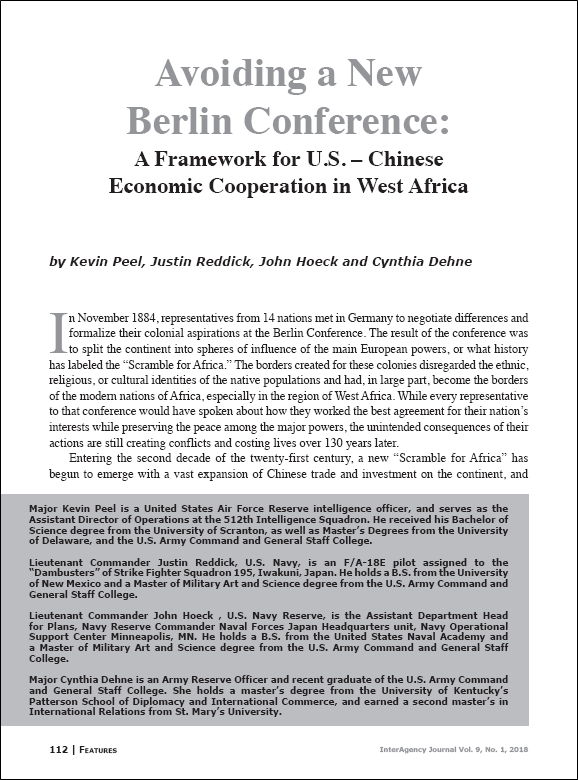Featured Article: A Framework for U.S.-Chinese Economic Cooperation in West Africa
Featured article:
Avoiding a New Berlin Conference: A Framework for U.S.-Chinese Economic Cooperation in West Africa
by Kevin Peel, Justin Reddick, John Hoeck and Cynthia Dehne
In November 1884, representatives from 14 nations met in Germany to negotiate differences and formalize their colonial aspirations at the Berlin Conference. The result of the conference was to split the continent into spheres of influence of the main European powers, or what history has labeled the “Scramble for Africa.” The borders created for these colonies disregarded the ethnic, religious, or cultural identities of the native populations and had, in large part, become the borders of the modern nations of Africa, especially in the region of West Africa. While every representative to that conference would have spoken about how they worked the best agreement for their nation’s interests while preserving the peace among the major powers, the unintended consequences of their actions are still creating conflicts and costing lives over 130 years later.
Entering the second decade of the twenty-first century, a new “Scramble for Africa” has begun to emerge with a vast expansion of Chinese trade and investment on the continent, and the U.S. government looking to readdress its interests as it begins to fall behind. China’s long-term presence posture has allowed Beijing to forge strong diplomatic relations with African governments and earn high favorability ratings among its populations, as it has grown into the continent’s largest trading partner. However, there is growing concern among both foreign and West African observers that China’s continued investment in the region is contingent on its ability to access natural resources, rather than on its intent to improve living conditions or economic growth…
Read the full article
Avoiding a New Berlin Conference: A Framework for U.S.-Chinese Economic Cooperation in West Africa PDF
Download the complete edition
IAJ 9-1 (2018) PDF
IAJ 9-1 (2018) ePub
Major Kevin Peel is a United States Air Force Reserve intelligence officer, and serves as the Assistant Director of Operations at the 512th Intelligence Squadron. He received his Bachelor of Science degree from the University of Scranton, as well as Master’s Degrees from the University of Delaware, and the U.S. Army Command and General Staff College.
Lieutenant Commander Justin Reddick, U.S. Navy, is an F/A-18E pilot assigned to the “Dambusters” of Strike Fighter Squadron 195, Iwakuni, Japan. He holds a B.S. from the University of New Mexico and a Master of Military Art and Science degree from the U.S. Army Command and General Staff College.
Lieutenant Commander John Hoeck , U.S. Navy Reserve, is the Assistant Department Head for Plans, Navy Reserve Commander Naval Forces Japan Headquarters unit, Navy Operational Support Center Minneapolis, MN. He holds a B.S. from the United States Naval Academy and a Master of Military Art and Science degree from the U.S. Army Command and General Staff College.
Major Cynthia Dehne is an Army Reserve Officer and recent graduate of the U.S. Army Command and General Staff College. She holds a master’s degree from the University of Kentucky’s Patterson School of Diplomacy and International Commerce, and earned a second master’s in International Relations from St. Mary’s University.

Posted: May 2, 2018 by Simons Center
READ THE LATEST UPDATES FROM THE SIMONS CENTER
"*" indicates required fields


